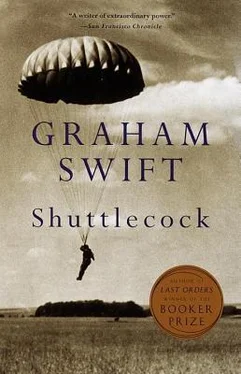Graham Swift - Shuttlecock
Здесь есть возможность читать онлайн «Graham Swift - Shuttlecock» весь текст электронной книги совершенно бесплатно (целиком полную версию без сокращений). В некоторых случаях можно слушать аудио, скачать через торрент в формате fb2 и присутствует краткое содержание. Год выпуска: 2014, Издательство: Vintage Books, Жанр: Современная проза, на английском языке. Описание произведения, (предисловие) а так же отзывы посетителей доступны на портале библиотеки ЛибКат.
- Название:Shuttlecock
- Автор:
- Издательство:Vintage Books
- Жанр:
- Год:2014
- ISBN:нет данных
- Рейтинг книги:3 / 5. Голосов: 1
-
Избранное:Добавить в избранное
- Отзывы:
-
Ваша оценка:
- 60
- 1
- 2
- 3
- 4
- 5
Shuttlecock: краткое содержание, описание и аннотация
Предлагаем к чтению аннотацию, описание, краткое содержание или предисловие (зависит от того, что написал сам автор книги «Shuttlecock»). Если вы не нашли необходимую информацию о книге — напишите в комментариях, мы постараемся отыскать её.
Shuttlecock — читать онлайн бесплатно полную книгу (весь текст) целиком
Ниже представлен текст книги, разбитый по страницам. Система сохранения места последней прочитанной страницы, позволяет с удобством читать онлайн бесплатно книгу «Shuttlecock», без необходимости каждый раз заново искать на чём Вы остановились. Поставьте закладку, и сможете в любой момент перейти на страницу, на которой закончили чтение.
Интервал:
Закладка:
I drove back scarcely conscious of my route. I should have been thinking of Dad, of X and Z, of Shuttlecock , of those three agents who were shot in Mulhouse … And then suddenly — as if I really had been hypnotized and the hypnotist’s fingers had been snapped before my eyes — the reality of Quinn’s words struck me: I was going to be promoted — officially; I was going to get Quinn’s job. And I had this sudden urge to get drunk.
I stopped off at the pub I knew, by Wimbledon Common. I was already tipsy from the gins I’d drunk. I hadn’t eaten all evening and it was by now past the time when, had I been to see Dad as usual, I would have returned home for the supper Marian kept for me. But I stopped at the pub, ordered a large gin and tonic and took it outside to drink. People were sitting at wooden tables, chatting and laughing. It seemed I’d emerged out of some confinement. Perhaps the people were happy because of the warm summer twilight wrapping round them and making the world grow soft and dim. Perhaps it was all a case of the pathetic fallacy. Then I thought: these people are happy because of what they don’t know.
When I got home Marian said: ‘You’re drunk.’ (I’d had more than one drink at that pub.) ‘You’re drunk. You’re late, and your dinner’s spoilt.’ It was like a scene in some hackneyed domestic comedy. I could see in her face her worry about where I had got to; and I could see that she thought the moment gave her a right to wield a little authority over me, to scold me, to have the upper hand. But I could see too that, despite her efforts, she was afraid to do this. She was afraid because I was drunk (I’m not often drunk, as a rule; I’m not a man who goes in much for big drinking) and because I was drunk I might hit her. (Though I won’t hit Marian again, no, never.) But she was afraid, in any case, that if she attempted to scold me I would make her suffer for it. I could see this fear and this desire to have a little power struggling in her face and so I hugged her, kissed her and said, ‘It’s all right.’ She was so surprised at this (it’s a long time since I’ve given Marian a hug on my return home) that she became subdued, even wary. Her blue-green eyes flickered. ‘How’s Dad?’ she said. Then I realized what she might be thinking: Dad’s recovered, Dad’s spoken again. That’s why I’ve gone and got drunk. I thought: in a way that’s just what’s happened. She looked suddenly alarmed. And so I kissed her again. ‘Dad’s fine,’ I said, ‘fine, fine.’ And then I said: ‘I’m going to be promoted. I’m going to get Quinn’s job.’
[33]
It is over six months now since Quinn left our office. His departure was marked by the minimum of ceremony. A gathering of senior staff in one of the offices upstairs, to which, of course, myself, Vic, Eric, Fletcher and O’Brien and most of our junior ancillary staff were duly invited. Drinks and little sausages on sticks. The presentation of a gift for which I took the initiative for collecting contributions, and which for some time remained a problem until I remembered the battered golf bag I’d seen in Quinn’s conservatory. Golf-clubs are not cheap, and I don’t mind saying that I myself forked out in secret an extra large donation in order to buy the set, complete with bag, that the man in the sports shop assured me was the best. Speeches. A short valediction in which Quinn kept strictly within the emotional limits prescribed by such occasions, not allowing any undue warmth to melt, at the last moment, his traditionally chilly manner; and in which he wished, with no hint of special sentiment, ‘every success to my young and able successor’ in the seat which was ‘by now’ (dutiful ripple of amusement) ‘nicely warmed’. A breaking-up into general drinking, chit-chat and hypocritical well-wishing from which Quinn himself slipped away, scarcely noticed, not deigning to join us in the session which followed in the pub around the corner. I too slipped away from this second bout of drinking while it was still in its early stages, to learn later, from Vic, that it had developed into an orgy of Quinn-bashing, and from Eric — with whom, being now his superior, I found I could not listen to such things without making vague signs that he was being over-familiar — that this same session had led to another in which he had positively and completely explored all the remaining hidden charms of the tantalizing Maureen.
And so to the next Monday morning, and to sitting in that leather chair, which was not warm but distinctly cool (October; the office heating not yet coaxed into life), and which seemed, and still seems, I might add, too big for me.
I haven’t seen or heard of Quinn since. No phone calls or invitations. No chance, passing visits back to his old office. I imagine that is how he wishes it to be. We will cease to associate, like old accomplices who have done the deed and gone to ground. Our mutual silence will be as constant as Dad’s.
But very often, I think of Quinn. I wonder what he is doing; how he is spending his ‘retirement’. For with a man like Quinn, so solitary, so formerly work-bound, there seems no way in which this phrase can conjure up its usual stock of clichés. What will he do? The only picture I can summon of him is of a man walking — no, limping — almost continuously over the turf of a golf course, dragging a bag of golf-clubs which have already lost their new shine, pitting himself, not against the skill of others (for somehow I am sure that Quinn, with his metal foot, is neither a good nor a competitive player), but against his own deficiencies, his own nagging uncertainties, harrying the little ball towards its far-off home. Or I see him, an even more solitary figure, on one of those mythical sea-cruises the newly-retired are supposed to take, gazing from the stern-rail as the sun sets, over Madeira or Tenerife, and yet unable to drink in fully, to be pacified completely by the magic of the scene, because he cannot, ever, quite shake from his mind the memory of all those skeletons locked away in cupboards. I think, one day Quinn and I will meet, like secret agents at some seemingly innocent rendezvous — to feed the ducks on Clapham Common, to watch the animals at the zoo. I think of Quinn when I go to see Dad. Quinn … Dad. One day they, too, must meet.… But all these things, of course, are romantic visions. Lurid imagination. I think again. Quinn has his garden, his conservatory, his Siamese cats.…
And I am left only with the after-image of Quinn’s official self which I wear about my own person by virtue of occupying his desk. I look at the cherry tree through the window (nearly May again; it has passed the peak of its bloom). I summon Miss Reynolds (at first a shy and reluctant servant to a new, young master) on the intercom. I write down instructions. I survey the others (my old place taken by Eric) through the glass partition. I even suspect that I am developing the hint of a limp, and that one day, not far off perhaps, my hair will start to recede and I will simultaneously find myself in need of glasses.
And, what is more, I have the combination to the safe that, previously, was accessible only to Quinn, and I have the right to unseal all those sealed files which, previously, only Quinn could open.
Eric has just looked up. He has seen me standing at the partition, sipping the cup of tea Miss Reynolds has brought me, and his eyes have betrayed that faltering compromise that I know so well from experience: not turning away at once, but hesitating to give the full counter-stare. A tense, awkward look, perhaps lasting two seconds. Then he lowers his head abruptly, with an air of returning purposefully to his work; and then, after a few seconds more, his hand goes up to push the hair from his forehead and scratch his crown — perhaps to give an added impression of industry, but more likely to signal to me in some pleading way (for he knows I am still watching) that he is puzzled. In the last few months this bewildered, anxious, even melancholy expression has crept into the features of Eric, who was never one, in the past, to let the business of the office unduly preoccupy him. Where is the Eric who once boasted of his conquests in the typing pool, and who did not let his wife and family stand in the way of his not entirely plausible adventures with Maureen (of whom he no longer speaks)? A reasonable deduction might be that added responsibility has sobered and perplexed him; that in moving up the ladder from junior assistant number two to junior assistant number one (no huge advancement) he has come up against his own unhappy limitations. But I know this is not the case. He has every reason to be puzzled. Half the items in that file he is looking at now are missing.
Читать дальшеИнтервал:
Закладка:
Похожие книги на «Shuttlecock»
Представляем Вашему вниманию похожие книги на «Shuttlecock» списком для выбора. Мы отобрали схожую по названию и смыслу литературу в надежде предоставить читателям больше вариантов отыскать новые, интересные, ещё непрочитанные произведения.
Обсуждение, отзывы о книге «Shuttlecock» и просто собственные мнения читателей. Оставьте ваши комментарии, напишите, что Вы думаете о произведении, его смысле или главных героях. Укажите что конкретно понравилось, а что нет, и почему Вы так считаете.












